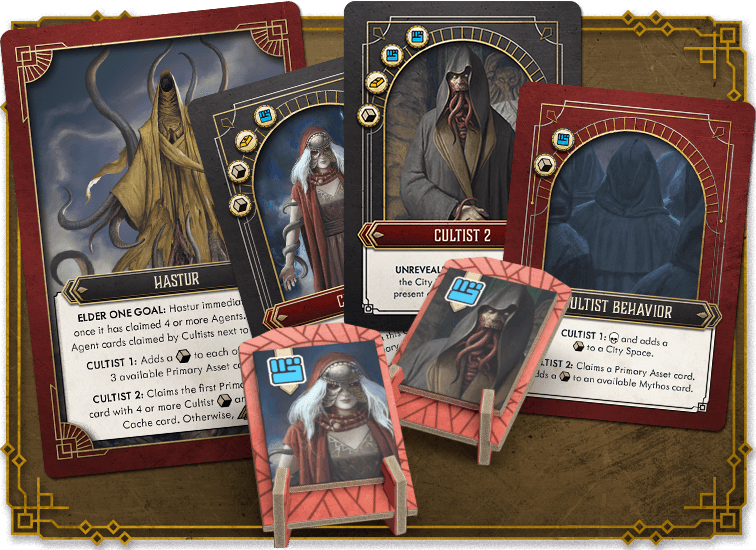Cthulhu: Dark Providence

“And for the support of this Declaration, with a firm reliance on the protection of divine Providence, we mutually pledge to each other our Lives, our Fortunes, and our sacred Honor.”
Cthulhu: Dark Providence is a new take on Martin Wallace’s acclaimed board game A Study in Emerald, which combines deck building mechanics, secret agendas, and the creations of H.P. Lovecraft.
Set in the world of Cthulhu: Death May Die, in a period in which the Great Depression rages across most cities of the United States, cultists explore the nation's vulnerability, seeking to remake it into a twisted version of itself by consorting with unspeakable beings from nightmarish dimensions. Investigators take the opposite side, standing against this dark providence.
Players are secretly divided onto both sides of this conflict and use their influence to bid for the right to claim assets, take control of cities, and consort with powerful Mythos. Trying to keep their identity secret and avoiding insanity, players perform a multitude of actions, swaying agents to their side, assassinating rival agents, blocking opponents from performing actions, and sealing or protecting gates to otherworldly dimensions, among others to progress their agenda and score points. Although players are divided into opposing sides, this is not a team game. Only the player with the highest score of the leading side in the battle will claim victory and change the destiny of the nation.
GAME COMPONENTS
- Game Board
- Track Board
- 5 Player Dashboards
- 6 Alignment Cards
- 150 Asset Cards
- 24 Mythos Cards
- 16 Solo Game Cards
- 5 Player Aids
- 95 Influence Cubes
- Sanity Test Bag
- 30 Cardboard Frames
- 27 Agent Tokens
- Cthulhu Standee
- 105 Tokens
At the start of the game, players are divided, secretly, onto different sides of the conflict.
Investigators seek to prevent the impending doom looming just outside of the edges of our world. Investigators score points by sealing Gates, claiming Agents, and advancing the Investigation track. Their lives and sanity are always at risk. If driven to Insanity, the game ends immediately.
Cultists seek to usher in an era of darkness and chaos whereupon their otherworldly masters will reward them for their servitude. Cultists score points by protecting Gates, assassinating Agents, claiming Mythos cards, and advancing the Ritual track. Cultists driven to insanity don’t trigger the end of the game, and in reward for their loyalty are immortal.
Dissidents are a brand-new Alignment introduced in Dark Providence. Once Cultists and Investigators, Dissidents have since become disillusioned with their loyalty and are no longer part of either side. Dissidents score points for assassinating Agents, for sealing and protecting Gates, and for progression of their former loyalty. As enemies of both sides of the struggle, concealing their identity is paramount and they suffer penalties if they ever have their Alignment exposed.
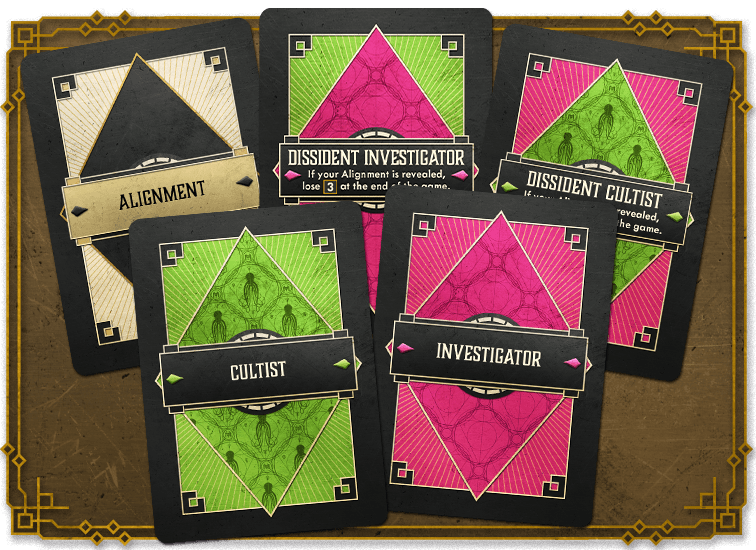

At the center of Dark Providence’s deck building mechanics lie the Asset cards. All players start the game with the same 10 initial cards. Regardless of their strategy, acquiring new Asset cards is fundamental to improve their decks, which increases their chances of drawing better hands, as well as unlocking new actions and benefits. New Asset cards are either scattered across the 12 locations on the board or in the form of the cities themselves. Cards in the locations provide a wider range of effects but are harder to come by. City cards, on the other hand, are easier to acquire but are always in dispute as, in addition to their effects, they provide coveted victory points.
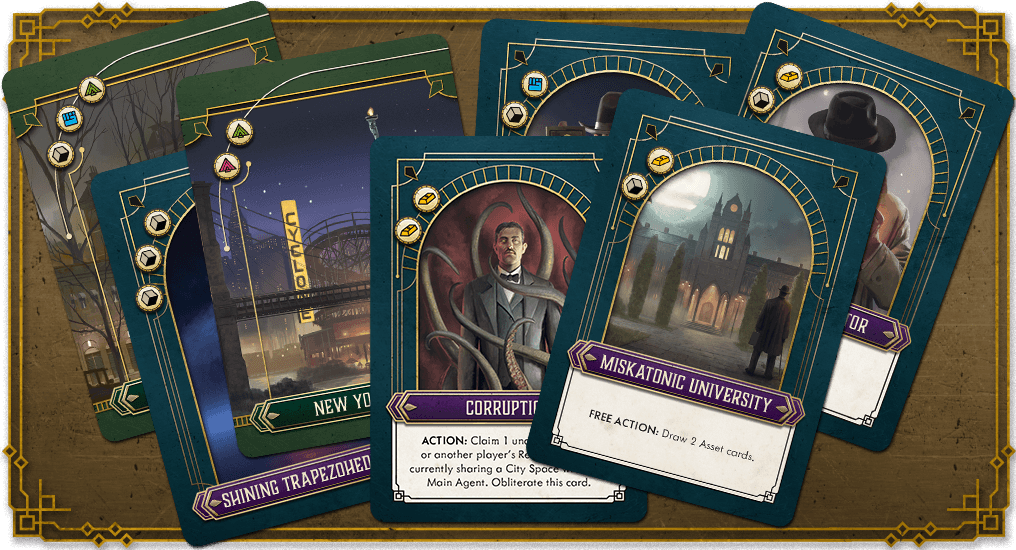

Each player starts with a Main Agent on the board and throughout the game, may recruit new ones to serve their cause and perform their bidding. Among these Agents, players may recognize familiar faces that have managed to keep their involvement with the Mythos under wraps until now. Famous personalities include Eliot Ness, Lillian La France, and Wyatt Earp among others. Agents have their work cut out for them. They travel the cities of the eastern US, closing or protecting Gates and assassinating opponents. A few of them also have unique abilities, such as Harry Houdini who can never be assassinated. Agents, however, need to be careful about exposing themselves to the eldritch horrors, as they are still susceptible to insanity and corruption and risk becoming revenants themselves.
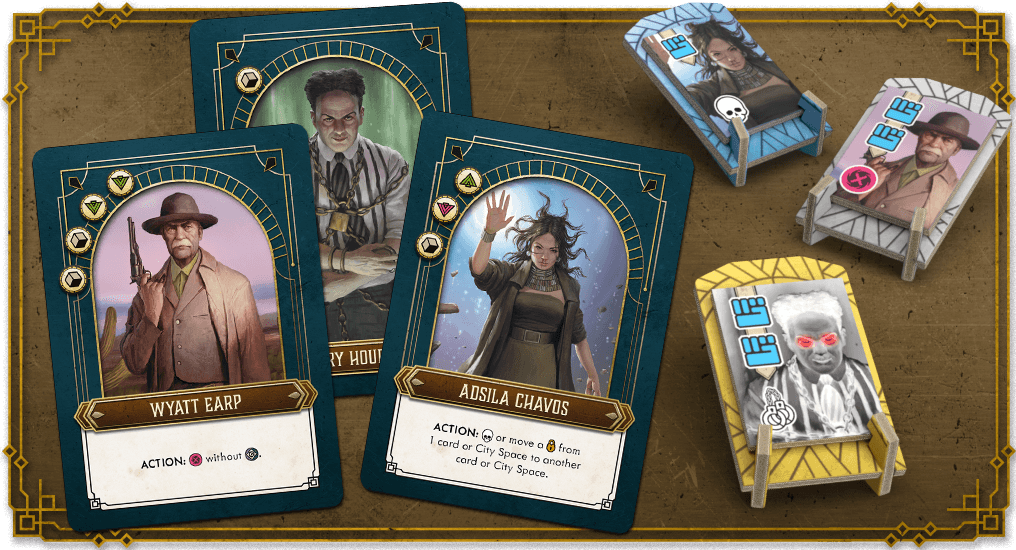

The Mythos lies in wait, forever lurking just beyond the threshold, biding its time, tempting mankind. In Dark Providence, the Mythos manifests itself through Mythos cards, which can range from eldritch beings that haunt the living to important relics and people that are intrinsically connected to it.
Given its uncanny nature, Mythos cards provide powerful, permanent effects that players can use during the game. But unlike other cards, Mythos cards are never shuffled into a player’s deck. Consorting with the Mythos is as dangerous as it is rewarding, as players often have to dabble with insanity to gain their favors, which can even bring Elder Ones to our reality, like Hastur, the King in Yellow, or Cthulhu, the Great Dreamer, himself.
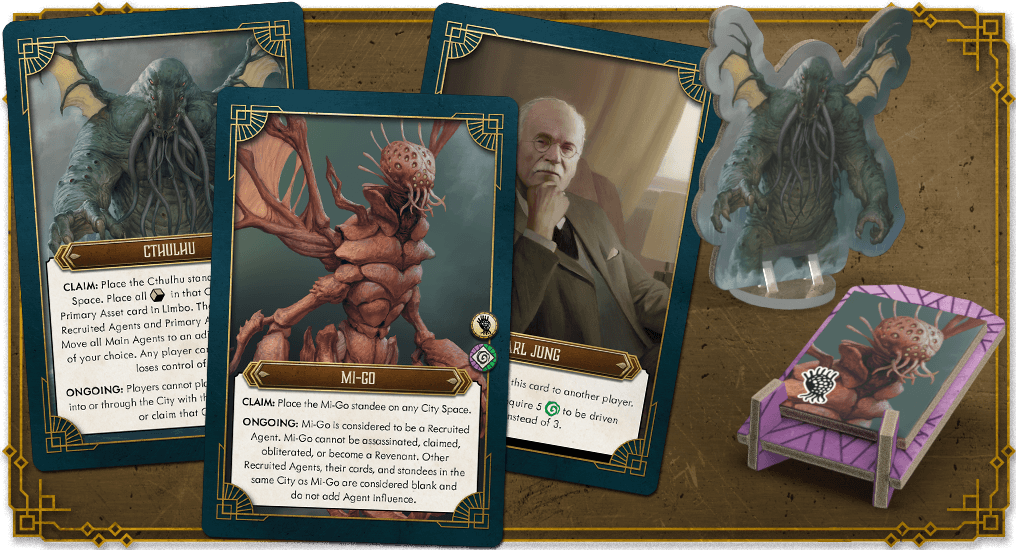

Regardless of which side of the conflict players are on, by exposing themselves to otherworldly allies and menaces, they are all subject to insanity. Each time they perform actions that push the limits of reason, such as taking control of cities or seeking the aid of the Mythos, players have to perform a blind sanity test. The consequences, however, affect each side differently. Investigators and Dissidents can only take so much, and by drawing a third insanity token, lose their minds and trigger the end of the game. Cultists are arguably already a bit insane and can better withstand the unknown. The only risk they run is to expose their true nature to others.
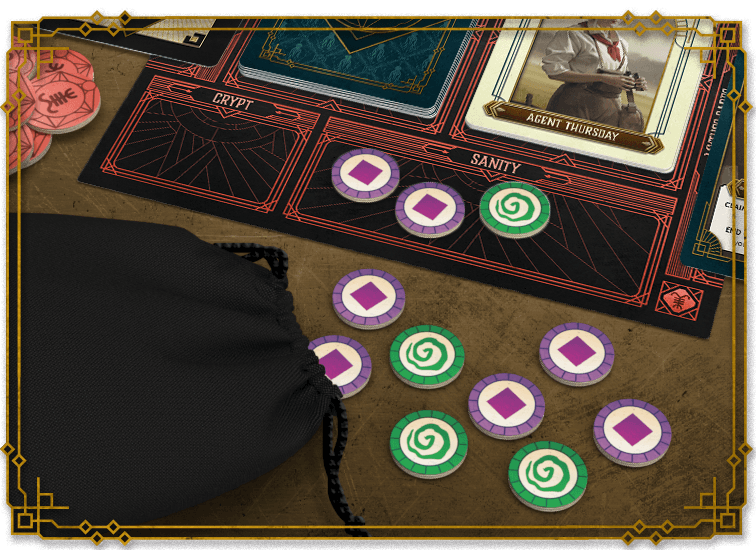

In addition to revamped rules, Dark Providence brings a brand-new way to play the game, in which a single player comes face-to-face with an Elder One attempting to corrupt the nation. The player takes the side of Investigators and plays against 1 of 6 Elder Ones, each with unique features and goals: Cthulhu, Hastur, Nyarlathotep, Yog-Sothoth, The Black Goat, and Dagon. The Elder Ones don’t play fair, though, and are ready to crush the one that stands between them and their ambitions, and in this epic fight, they have the advantage. In addition to controlling 2 Cultists, Elder Ones gain power faster and have more chances of victory, either by scoring points or completing their goal.
